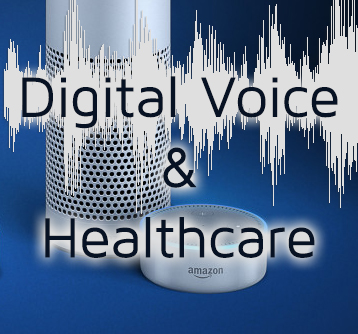Posted By Monique Dever On December 20, 2018
Digital Voice Assistants in Healthcare

One of the most disruptive technologies today are digital voice assistants, such as Amazon’s Alexa, Apple’s Siri, and Google’s Assistant. Whether used for shopping or controlling home entertainment, this technology is quickly expanding into many arenas outside the home. Does it have a place in healthcare?
Various voice-dictation softwares have already been used for many years to record encounter notes in electronic health records. But digital voice assistants can reach far beyond the boundaries. These programs can retrieve actionable information from patient’s medical records such as insurance eligibility, or deductible balances and much more. There are already hundreds of Health and Fitness “Skills” for Alexa alone where people and healthcare providers can find out health related tips and answers about themselves or their patients. A home-use health tip is pretty inconsequential, but in the healthcare environment it could scrape into the granite of Health Insurance Portability and Accountability Act (HIPAA) compliance if someone overheard a private digital conversation. This issue is just one reason why many providers are just not yet ready for adoption of digital voice assistants and AI to be integrated into the EHR or the healthcare environment.
However, these features are being pushed by technical advances, consumer technology and changing user population. Overlapping technologies hold a lot of promise. For example, newer voice technology could be used to document and control Electronic Health Record software. For example, the nurse could say “Hey EHR, open record for patient Jane Doe. Start new family planning note.” This opens the patient record and starts a note without a manual search.
Next is to combine voice with artificial intelligence (AI). For example, a nurse can ask “Hey EHR, do I have enough Flu vaccines for the immunization drive at Green Hope High School on next Tuesday?” The EHR understands the command, has the ability to determine the stock of Flu vaccines, and can analyze previous immunization drives at Green Hope High. To go a step further, the system can determine who else may use these vaccines before the drive based on appointments and daily usage trends, and then provide a precise answer to the nurse whether additional stock needs to be ordered. Simple. And it is already happening.
With the possibilities of voice assistant technologies improving healthcare, there are three use-case pilot programs currently in progress by the Innovation and Digital Health Accelerator (IDHA) at Boston Children’s Hospital: Intensive Care Unit, Organ Transplant and Home Health.
With the use of voice inquiries or commands, each of these trials provide hands-free, immediate access, and time saving features that can be critical to patient outcomes.
Home health digital voice assistants are already widely used through hundreds of apps or “Alexa Skills” openly available to the public. For example, Boston’s Children’s Hospital’s Alexa Skill, KidsMD, guides parents through the decision process when their children are sick with common ailments such as ear infections or colds, or medication dosing and provides advice about how to care for them at home; or if they should bring their child to the doctor.
Amazon’s CEO, Jeff Bezos, has been quoted as saying “I think healthcare is going to be one of those industries that is elevated and made better by machine learning and artificial intelligence. And I actually think Echo and Alexa do have a role to play in that.” But while the Amazon Web Services (AWS) cloud platform is already HIPAA compliant, according to HIPAA Journal “Amazon is keen to see its voice recognition technology used more extensively in healthcare. However, before the true potential of Alexa can be realized, Amazon must first make Alexa HIPAA compliant.” That may be sooner than you think.
Share this post:



